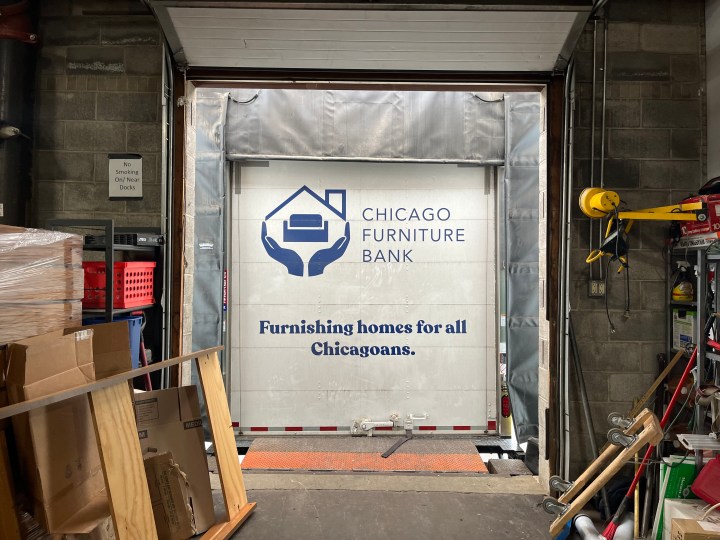
Asylum seekers are overwhelming shelters in some cities — can rental assistance help?
Asylum seekers are overwhelming shelters in some cities — can rental assistance help?

On a recent Wednesday, a truck full of secondhand furniture pulls up in front of a basement apartment on a tree-lined street in Chicago. Movers unload a bed.
“We’re supposed to set ‘em up for you. Do you need us to set ‘em up?” a mover asked.
The new residents here are Joseph and Martin. (We’re only using their last names for their safety.)
They’re moving into their first Chicago apartment after fleeing political upheaval in their native Nicaragua.
“I’m home finally. I have a place where I can call home,” Martin said.
Over the past year, the southern U.S. border has seen more and more migrants attempting crossings as hundreds of thousands flee political upheaval in their home countries. Texas and Florida have sent thousands of asylum seekers via bus and plane to so-called sanctuary cities, which are then faced with the challenge of finding housing.
In Chicago, the sheer clip of new arrivals has strained the city’s shelter system. And a dearth of affordable housing can make for a long wait.
Martin said they slept in city shelters for nearly nine months before getting the keys to their new place, where their rent is covered by the state. “Finally I’m going to sleep in my own bed,” Martin said.
About $11 million in federal relief has been disbursed in Illinois to more than 1,000 asylum seekers so far.
Applicants can get rent assistance for up to six months, and the program helps free up space in maxed out city shelters.
Cristina Pacione-Zayas, one of Chicago Mayor Brandon Johnson’s top deputies, said it’s not okay that hundreds of new arrivals have to sleep in police station lobbies because there are just no beds.
“We don’t want people to be staying in police stations,” Pacione-Zayas told a Chicago City Council Committee last month. “We need people in temporary shelters so that they can be on their path to resettlement.”
She said when asylum seekers move into permanent housing, then they can start to rebuild their lives.
“We want people to be self-determined, self-actualized, self-sustainable,” Pacione-Zayas said.
About 600 landlords participate in the Illinois program. While they get rent money from the state, they still vet prospective tenants for things like criminal backgrounds, credit scores and rental history, said Luz Maria Cortez, a community assistance program manager for La Casa Norte, a Chicago nonprofit that helps asylum seekers apply for rent assistance.
Cortez says sometimes large property management companies don’t approve applications from new arrivals who don’t have much of a background to check.
“They just got to the United States. So they don’t have any of that,” Cortez said of asylum seekers. “So more than 90% of the time, I would say that they’re getting denied for those apartments.”
It’s a problem that’s playing out across the U.S. amid a nationwide shortage of affordable housing.
Ellen Beattie works on the International Rescue Committee’s resettlement, asylum and integration team. She said rising rents don’t help.
Her organization is seeing, “on average, a 12% increase year over year in the rental rates,” Beattie said.
The IRC offers asylum seekers loans for up to six months of rent that they can pay back with no interest.
But six months of assistance often runs out before asylum seekers can legally work. They can’t apply for a work permit until about five months after submitting their asylum application.
“It could take 12 to 18 months before they are fully documented and able to work while still pending the outcome of their asylum case,” Beattie said.
That leaves many asylum seekers looking for work wherever they can.
Like Martin, the woman moving into the basement apartment. She said she did find a job as a caregiver. But it was short-lived without a work permit.
“I made it for six weeks, but I had to leave because I didn’t have a permit and they were asking me,” Martin said.
Martin’s three sons are still in Nicaragua with her parents. She hopes to bring them to Chicago one day.
She’s excited to show them her new apartment over WhatsApp. She already knows what they’ll say.
“They would be happy,” Martin said. “They would say, ‘Mommy, I want to go. Since you have a home now, you are not in a shelter, we could go now?’ Yeah, they would be very happy to be here.”
For now, she moves forward with something she’s had nearly a year to practice: patience.
There’s a lot happening in the world. Through it all, Marketplace is here for you.
You rely on Marketplace to break down the world’s events and tell you how it affects you in a fact-based, approachable way. We rely on your financial support to keep making that possible.
Your donation today powers the independent journalism that you rely on. For just $5/month, you can help sustain Marketplace so we can keep reporting on the things that matter to you.

















